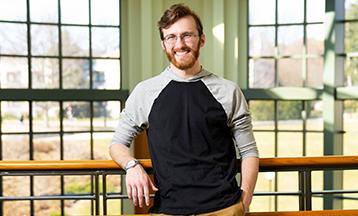-
About
- Friday, May 17, 6 p.m.
- Saturday, May 18, 11 a.m.
Commencement
Celebrating the Class of 2024
About
-
Academics
- Friday, May 17, 6 p.m.
- Saturday, May 18, 11 a.m.
Commencement
Celebrating the Class of 2024
Academics
-
Admission & Financial Aid
- Friday, May 17, 6 p.m.
- Saturday, May 18, 11 a.m.
Commencement
Celebrating the Class of 2024
Admission & Financial Aid
-
Student Life
- Friday, May 17, 6 p.m.
- Saturday, May 18, 11 a.m.
Commencement
Celebrating the Class of 2024
Student Life
- Athletics
- Test
Students talking in front of posters

Mac Mugabo
Kigali, RwandaAcademic School
Liberal Arts, Management, ScienceCampus
New YorkMac Mugabo ' 21对人权和社会正义有着深刻而持久的兴趣, which is not surprising given his background. Mugabo, 经济学和政治学双学位,辅修环境政策, grew up in Rwanda, 在1994年春天遭受了对图西人的毁灭性种族灭绝. About one million people were killed. Like most Rwandans, 穆加博的家人受到种族灭绝的影响:他失去了亲人, and his parents were refugees for a time.
当一位朋友告诉穆加贝萨拉热窝的人道行动奖学金时, he was immediately interested in applying. 行动中的人类是一个国际性的教育组织, inspires, 并将致力于促进人权的大学生和年轻专业人士联系起来, diversity, 在他们自己的社区和世界各地积极的公民. 一年一度的“行动中的人类奖学金”汇集了150多名在丹麦参加暑期计划的奖学金获得者, France, Germany, the Netherlands, Poland, the United States and Bosnia and Herzegovina to discuss, learn, and research in international groups. 研究员与知名专家和活动人士会面,研究历史和当代机构侵犯人权和少数群体权利的案例.
From June 8 to July 3, 穆加博在萨拉热窝加入了其他15名人道行动研究员, including students from the University of Pennsylvania, Tufts University, Bard College, the University of Sarajevo, King’s College London, Goethe University, and the University of Copenhagen. 穆加博说:“我很谦卑地遇到了我遇到的那些人. Some had master’s degrees, and some worked for the United Nations, but all were so intelligent and open. 我感到很荣幸能与与我有共同价值观并希望从我的经历中学习的人一起工作. It feels so good to know that you’re not alone, 还有很多人在为社会的积极变化而努力.该小组参加了各种专家的讲座和研讨会,并参观了巴尼亚卢卡等研究地点, Prijedor, Srebrenica, Konjic, and Mostar.

所有“人道行动”奖获得者在萨拉热窝期间都参与了一个项目, 而穆加贝则专注于为穆斯林和塞尔维亚人之间建立对话机会. As part of his project, Mugabo和其他三位研究员创建了一个视频博客,致力于波斯尼亚青年之间的和解,并探索将他们分开的“无形边界”. 他们采访并拍摄了年轻人谈论在分裂的城市生活是什么样子的, 他们对旅行和去“另一边”有什么感觉,” and the obstacles they faced. 他们的集体努力被制作成一个视频,代表波斯尼亚年轻人对和解和流动的看法, 在“行动中的人性”电影制作研讨会上向学生们展示的照片.
为期一个月的研究让穆加博有机会反思针对图西族人的种族灭绝与1992年至1995年波斯尼亚内战期间发生的种族灭绝之间的异同. 根据Mugabo的说法,“比较卢旺达和波斯尼亚的经历很有趣. 卢旺达基本上被国际社会抛弃了, 与此同时,国际社会进行了军事干预,并在波斯尼亚建立了政治制度. Yet, Rwanda is in a much better place now. 它正在成为一个经济强国,在和解和民族愈合方面取得了很大进展. 然而,在波斯尼亚,仍然有很多分裂和未解决的痛苦.”
穆加贝认为,区别在于谁负责恢复和和解进程. “在种族灭绝之后,卢旺达必须为自己找到一个新的体系. There was a big cultural shift to unite the population. 我们不再认为自己是图西族、胡图族或特瓦族——我们都是卢旺达人.” In Bosnia, on the other hand, 战后的政治体系是由国际社会创造的(有人会说是强加的), and therefore never really received local buy-in. 人们仍然强烈地认同他们的种族群体.e., Muslims, Serbs, and Croats. 穆加博说:“在波斯尼亚的经历让我意识到,我们的悲剧没有受到质疑. There’s an accepted narrative.他补充说,“我对冲突后社会的心理健康特别感兴趣。. You have to want to forgive – it can’t be imposed. After a national trauma, it might seem impossible to conceive of what comes next, 但卢旺达的模式表明,超越分裂和冲突是可能的.”
Heading into his junior year at Marist, 萨拉热窝之行让穆加博充满活力,他期待着回到校园. He notes that he’s one of seven Rwandans at the College, and there are many other international students. 穆加贝说他一直感到被支持和关心, 他特别欣赏bet亚洲365欢迎投注每年纪念对图西人的种族灭绝. 他说:“我觉得火星社区总是支持你,愿意帮助你。. 他特别感谢研究生院和奖学金顾问帕特·泰勒, who helped with his Humanity in Action application, and to Marist alumna Darriel McBride ’17, 他也是“人道行动”奖学金获得者,并鼓励他申请. Says Taylor, “I first met Mac when he was a freshman. 他给我的印象是,他拥有一种不同寻常的真实性,并真诚地致力于为人类的进步而努力.”
尽管穆加博每年只能看到他在卢旺达的父母一次,但他并不想家. “What I considered home seems to have expanded at Marist. 家不仅仅是一个物理空间——它是人和关系. Nonetheless, 我将永远感激家人给予我的坚定支持, even when they are a continent away.” Looking ahead to life after graduation, 穆加贝正在考虑读研或寻求促进人权和社会正义的机会. 他强调,你不需要绕半个地球去做改变. “Activism doesn’t have to be that complex. Donate money to causes you care about. 让自己和他人了解世界上正在发生的事情. Empathize with people who are suffering. No one is too young or too old to share their tools.”



